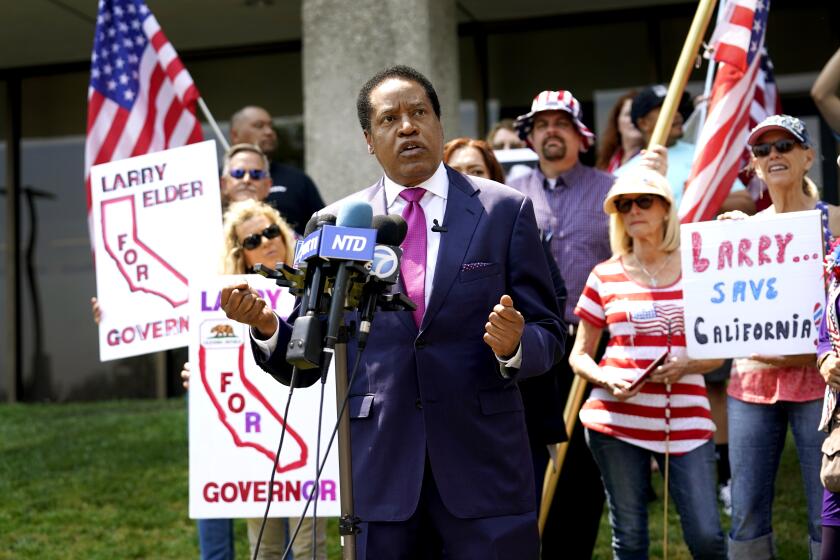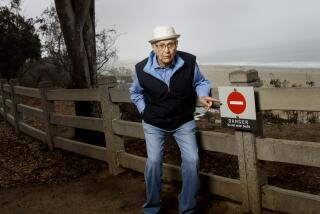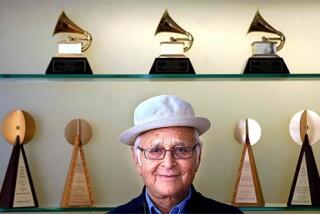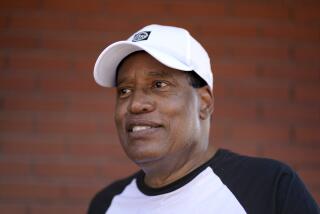Column: Larry Elder talks a lot. Too bad you can’t believe anything he says
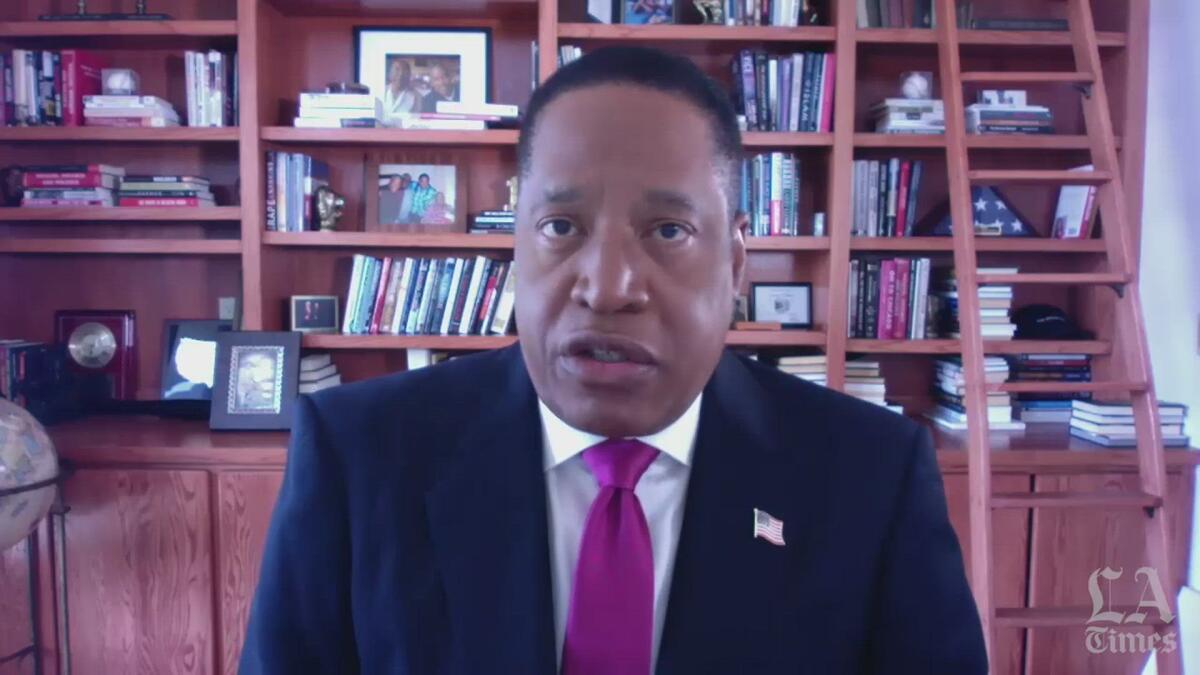
- Share via
Years ago, I briefly co-hosted a morning drive radio show in Los Angeles, which brought me into contact with Larry Elder, the conservative radio talk show host who is leading the Republican pack to replace Gov. Gavin Newsom in the state’s misguided recall election.
I was on the short-lived KTZN-AM (710); Elder was a rising star on our sister station, KABC-AM (790), with which we shared studios.
Once, at the end of my show, he came into the studio and asked if he could touch my hair.
It was weird and unexpected, which is why it was so memorable.
Now, as I read allegations by his ex-fiancee about his marijuana use, I wonder if he could have just been high and transfixed by my blowout.
Anyway, this was more than 20 years ago, when Rush Limbaugh was the biggest name in talk radio, his grievance-driven style a perfect match for his conservative, racist and sexist take on politics. Liberals and moderates gravitated to National Public Radio; choleric conservatives gravitated to talk radio.
It was a time when many a commercial radio talk show host held up a finger to the wind and concluded, hey, maybe being conservative is the way to go.
I don’t think Elder’s identification as a conservative is contrived; he told the San Jose Mercury News that he hasn’t voted for a Democrat since Jimmy Carter ran in 1976.
Elder was in the right place at the right time, and the conservative world loves nothing more than a Black man insisting that racism is a thing of the past.
::
He is a gifted talker whose talents are well-suited to his role as a contrarian.
As my colleague Jean Guerrero pointed out the other day, Elder can’t see racism even when it hits him in the face like a slap: “He said that the first year after he got a driver’s license, police stopped him ‘between 75 and 100’ times,” she wrote. To what does he attribute this obvious harassment? “He argues the stops happened because he ‘looked young.’”
Larry Elder’s alarming views on race and marginalized people would drive state policy for 40 million Californians, threatening immigrants’ rights and justice for all.
Mind you, Elder graduated from Crenshaw High School in 1970, five years after the Watts rebellion, during an era when the LAPD behaved as an occupying force in Black neighborhoods of the city.
In a recent news conference with opinion journalists from newspapers around the state, the Sacramento Bee’s Jack Ohman aptly described the loquacious Elder’s speaking style as “your torrent of words.”
It’s too bad you can hardly believe anything he spouts.
Elder has a special talent for dredging up headlines, news stories and studies he claims prove his talking points. Yet, more often than not, if you scratch the surface by, say, actually reading the stories and polls he cites, his disingenuous arguments crumble.
For instance, as an opponent of the minimum wage, Elder often cites a 1987 New York Times editorial that was headlined: “The Right Minimum Wage: $0.00.”
That was 34 years ago, and Elder never mentions that the Times editorial he is so fond of bringing up also proposed government wage supplements — with “cash or payments for medical insurance, pensions or Social Security taxes,” or a dramatic increase in the earned income tax credit for working poor families. “The working poor,” it said, “obviously deserve a better shake.”
Elder doesn’t seem to think so.
Nor will he tell you that as recently as 2019, the New York Times editorial board had a major change of heart and urged a doubling of the federal minimum wage. Studies show that raising it does not lead to lower employment, which is the hoary conservative argument against having any minimum wage at all.
Elder also loves to cite a 1987 Time magazine survey where Black teenagers between the ages of 13 and 17 were asked whether racism is a problem for them. As Elder repeatedly says, 89% of them said that racism was “a small problem” or “not a problem at all.”
But in the very same piece, sociologist Joe R. Feagin, who has studied and written extensively about racial attitudes, pointed out that “you have to be out looking for jobs and housing to know how much discrimination is out there. People doing that are usually over 19.” (Or driving a car, he might have added.)
If Elder wanted to step out of the 20th century into the 21st, a world where people can communicate instantaneously with small, handheld devices on platforms called “social media” — or where a teenage girl can record the murder of a Black man by a white police officer on her phone for all the world to see — he would discover that things have changed.
Black teenagers experience daily racial discrimination, most frequently online, which can lead to negative mental health effects, according to a 2019 study of 101 Washington, D.C.-area Black teenagers by lead author Devin English, a Rutgers School of Public Health psychologist. Black teenagers reported being subjected to an average of five-plus instances of discrimination a day, which led to short-term increases in symptoms of depression.
Hey, Larry, has it occurred to you that Black teenagers are less optimistic than they used to be?
Elder is adept at taking a kernel of truth and building it into an entire cornfield of nonsense, and he plays a shameless game of what-about-ism.
If he gets a question about the Jan. 6 insurrection, chances are he will reply with a baseless accusation that Hillary Clinton, who received millions more votes than Donald Trump, tried systematically to undermine the results of the 2016 election. Or he might claim that the majority of Democrats who erroneously believe that Russians tampered with vote tallies in 2016 are no different from the millions of Republicans who believe Joe Biden stole the election from Trump. (My guess is those Democrats were conflating Russian interference, of which there is ample proof, with altered vote tallies.)
Perhaps Elder’s most insidious misrepresentation is his claim that there is no systemic racism afoot in American policing because a 2016 study by Harvard Professor Roland G. Fryer Jr. found no racial bias in police shootings.
“It is the most surprising result of my career,” Fryer told the New York Times, a quote that Elder loves to repeat, despite the fact that Fryer has said the work was not a definitive analysis, nor did it look at the risk of being stopped by police, which studies show is much higher for Black people.
Something else Elder won’t tell you: Fryer’s study also found that Black men and women are much more likely than white suspects to experience physical force at the hands of police. They are more often touched, handcuffed, pushed to the ground, pushed into walls, pepper-sprayed or have had weapons drawn on them. In fact, the first sentence in the New York Times story Elder so often quotes goes like this: “A new study confirms that black men and women are treated differently in the hands of law enforcement.”
Ah well, Larry Elder has never let the facts stand in the way of his radical racial revisionism.
@AbcarianLAT
More to Read
A cure for the common opinion
Get thought-provoking perspectives with our weekly newsletter.
You may occasionally receive promotional content from the Los Angeles Times.
